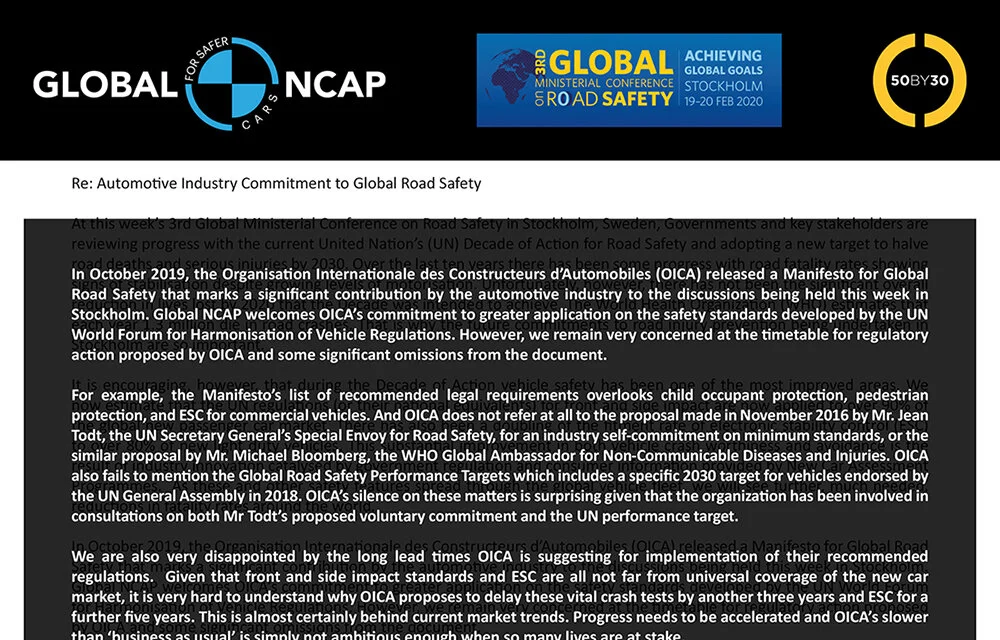Mr Akio Toyoda, President & Representative Director, Toyota Motor Corporation Dr Herbert Diess, Chairman of the Board of Management, Volkswagen AG
Mr Chung Mong-Koo, Chairman & CEO, Hyundai Motor Company
Ms Mary Barra, Chairman & CEO, General Motors Company
Mr James Hackett, President & CEO, Ford Motor Company
Mr Makoto Uchida, President & CEO, Nissan Motor Company Ltd
Mr Takahiro Hachigo, President & Representative Director, Honda Motor Company Ltd Mr Michael Manley, Chief Executive Officer, Fiat Chrysler Automobiles
Mrs Clotilde Delbos, Interim Chief Executive Officer, Groupe Renault
Mr Carlos Tavares, Chairman of the Managing Board, Groupe PSA
Mr Osamu Suzuki, Chairman & Representative Director, Suzuki Motor Corporation
Mr Wang Xiaoqiu, President, SAIC Motor Corporation Limited
Mr Ola Kallenius, Chairman of the Board of Management, Daimler AG
Mr Oliver Zipse, Chairman of the Board of Management, BMW AG
Mr An Conghui, President & CEO, Geely Auto Group
17th February 2020
Dear Presidents, Chairman, and CEOs
Re: Automotive Industry Commitment to Global Road Safety
At this week’s 3rd Global Ministerial Conference on Road Safety in Stockholm, Sweden, Governments and key stakeholders are reviewing progress with the current United Nation’s (UN) Decade of Action for Road Safety and adopting a new target to halve road deaths and serious injuries by 2030. Over the last ten years there has been some progress with road fatality rates showing signs of stabilisation despite growing levels of motorisation. Unfortunately, however, there has not been the significant overall reduction in lives lost by 2020 that the Decade was intended to achieve. The World Health Organization (WHO) estimates that each year 1.3 million die in road crashes. That is why the future commitments to road injury prevention being undertaken in Stockholm are so important.
It is encouraging, however, that during the Decade of Action vehicle safety has been one of the most improved areas. We now estimate that the UN regulations (or their national equivalents) for front and side impact are now applied to over 90% of the global new passenger car market. There has also been a doubling of the fitment rate of electronic stability control (ESC) to over 80% of new light duty vehicles. This substantial improvement in both vehicle crash worthiness and avoidance is the result of industry innovation catalysed by government regulation and consumer information provided by New Car Assessment Programmes. As these and other safety features spread through the global vehicle fleet, we will see further, much needed, reductions in fatality rates around the world.
In October 2019, the Organisation Internationale des Constructeurs d’Automobiles (OICA) released a Manifesto for Global Road Safety that marks a significant contribution by the automotive industry to the discussions being held this week in Stockholm. Global NCAP welcomes OICA’s commitment to greater application on the safety standards developed by the UN World Forum for Harmonisation of Vehicle Regulations. However, we remain very concerned at the timetable for regulatory action proposed by OICA and some significant omissions from the document.
For example, the Manifesto’s list of recommended legal requirements overlooks child occupant protection, pedestrian protection, and ESC for commercial vehicles. And OICA does not refer at all to the proposal made in November 2016 by Mr. Jean Todt, the UN Secretary General’s Special Envoy for Road Safety, for an industry self-commitment on minimum standards, or the similar proposal by Mr. Michael Bloomberg, the WHO Global Ambassador for Non-Communicable Diseases and Injuries. OICA also fails to mention the Global Road Safety Performance Targets which includes a specific 2030 target for vehicles endorsed by the UN General Assembly in 2018. OICA’s silence on these matters is surprising given that the organization has been involved in consultations on both Mr Todt’s proposed voluntary commitment and the UN performance target.
We are also very disappointed by the long lead times OICA is suggesting for implementation of their recommended regulations. Given that front and side impact standards and ESC are all not far from universal coverage of the new car market, it is very hard to understand why OICA proposes to delay these vital crash tests by another three years and ESC for a further five years. This is almost certainly behind current market trends. Progress needs to be accelerated and OICA’s slower than ‘business as usual’ is simply not ambitious enough when so many lives are at stake.
As leaders of companies that together account for over 80% of total worldwide automobile production, we hope that you will be able to provide stronger leadership than so far shown by OICA. We trust that you will fully support the Stockholm Declaration being adopted this week and the new #50by30 target. We would also urge you to go further and respond positively to Mr Todt’s call for an industry self-commitment. In this regard, we would encourage you to either collectively or individually accept a voluntary commitment to implement all the Manifesto’s proposed legal recommendations (amended to include child occupant protection, pedestrian protection, and ESC for commercial vehicles) by the end of 2020.
This would be a fitting way for the automotive industry to mark the end of the UN Decade of Action for Road Safety and ensure that all new vehicles produced worldwide over the next ten years will meet minimum standards of safety. That would demonstrate real leadership and commitment to both the safety related Sustainable Development Goals and the new #50by30 target.
Yours sincerely
David Ward President & CEO
cc:
Mr Jean Todt, UN Secretary General’s Special Envoy for Road Safety Mr Erik Jonnaert, OICA, Special Ambassador for Road Safety





